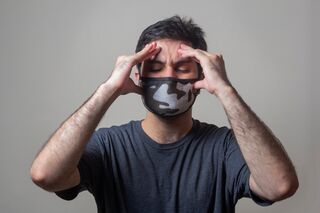Health
Have Your COVID Concerns Crossed Into Health Anxiety?
Your anxiety about your health may have become unmanageable.
Posted March 21, 2022 Reviewed by Ekua Hagan
Key points
- Health anxiety (illness anxiety disorder) occurs when people become preoccupied with either having or developing a serious medical condition.
- The COVID pandemic can exacerbate health anxiety and impact one's quality of life.
- Cognitive-behavioral therapy is an effective treatment for health anxiety.

It is typical to be concerned about your health, especially during a pandemic. But when does concern cross into health anxiety?
You may find that your anxiety was more generalized before the pandemic—there was not one specific thing that increased your anxiety. However, now you are experiencing anxiety about COVID-related symptoms and other symptoms in general.
What Is Health Anxiety?
Health anxiety (also known as illness anxiety disorder in the DSM-5) occurs when people become preoccupied with either having or developing a serious medical condition. Health anxiety usually begins in early or middle adulthood. A person with health anxiety will try to decrease symptoms through various means, but the methods increase their anxiety and worsen physical symptoms (Haig-Ferguson, et al., 2020).
Other symptoms of health anxiety include:
- Self-monitoring for signs of illness
- Hypervigilance about your health
- Avoidance of medical care or frequently seeking medical care
- Experiencing intrusive images
- Having somatic symptoms
Intrusive imagery occurs in 78% of subjects with health anxiety (Muse, et al., 2010). These intrusive images tend to fall into four categories: being told you have a serious illness, suffering from a serious illness, dying due to illness, and the impact of your death on loved ones. When you have intrusive images, you may try to push them away or distract yourself. However, the images seem to be uncontrollable.
Who Is at Risk for Developing Health Anxiety?
If you have any of the following characteristics, you are more likely to develop health anxiety:
- A history of chronic health issues
- A history of trauma
- A history of health issues with a sudden onset of symptoms (asthma, inflammatory bowel disease, etc.)
- A family history of anxiety
- A loved one experienced a sudden life-changing medical event
- You live alone
Health anxiety can cause physical symptoms to manifest themselves. People with health anxiety have felt chest pain, numbness, tingling, headaches, shortness of breath, rapid heartbeat, nausea, stomach pain, and tunnel vision.
Do You Have Health Anxiety?
Are you having typical concerns about COVID, or has it crossed into health anxiety? See if you have experienced any of the following:
- Your fears about your health are impacting your quality of life.
- Your fears are out of proportion to the actual threat.
- You are avoiding reasonably safe activities.
- Healthcare providers cannot find a source of your symptoms other than stress or anxiety.
- You avoid going to healthcare providers.
- You find yourself ruminating (getting stuck) on a cough or sneeze to the point where you cannot engage in other activities.
- Even when reasonable precautions have been taken, talking to someone in-person significantly increases your anxiety, potentially leading to avoidance.
- You have obsessively searched symptoms online (cyberchondria).
- Your loved ones and friends tell you they are concerned about your behavior.
- Your loved ones and friends are annoyed or upset because you have repeatedly asked them if you have a temperature or other symptoms.
What Can You Do if You Think You Have Health Anxiety?
- See a mental health professional. Some counselors have expertise in health-related anxiety. Cognitive-behavioral therapy is effective in treating health anxiety. Your counselor can assess health anxiety using scales such as the Health Anxiety Inventory (Salkovskis, et al., 2002).
- It may be challenging for you to curb excessive searching of health symptoms, also known as “cyberchondria” (McMullan, et al. 2019). If you must search, look up “health anxiety.” Sometimes changing the goal can help decrease the need to search.
- Visit forums such as Reddit’s /r/healthanxiety. It can help to know that you aren’t alone in your experiences. If your anxiety increases as you read others’ stories or if they are triggering hypervigilance about your health, you might need to take a break.
Fortunately, treatment for health anxiety is available and effective.
To find a therapist, please visit the Psychology Today Therapy Directory.
Copyright 2022 Sarkis Media LLC
References
Haig-Ferguson, A., Cooper, K., Cartwright, E., Loades, M. E., & Daniels, J. (2021). Practitioner review: Health anxiety in children and young people in the context of the COVID-19 pandemic. Behavioural and cognitive psychotherapy, 49(2), 129-143.
McMullan, R. D., Berle, D., Arnáez, S., & Starcevic, V. (2019). The relationships between health anxiety, online health information seeking, and cyberchondria: Systematic review and meta-analysis. Journal of affective disorders, 245, 270-278.
Muse, K., McManus, F., Hackmann, A., Williams, M., & Williams, M. (2010). Intrusive imagery in severe health anxiety: Prevalence, nature, and links with memories and maintenance cycles. Behaviour research and therapy, 48(8), 792–798. https://doi.org/10.1016/j.brat.2010.05.008
Salkovskis, P. M., Rimes, K. A., Warwick, H. M. C., & Clark, D. M. (2002). The Health Anxiety Inventory: development and validation of scales for the measurement of health anxiety and hypochondriasis. Psychological medicine, 32(5), 843-853.


